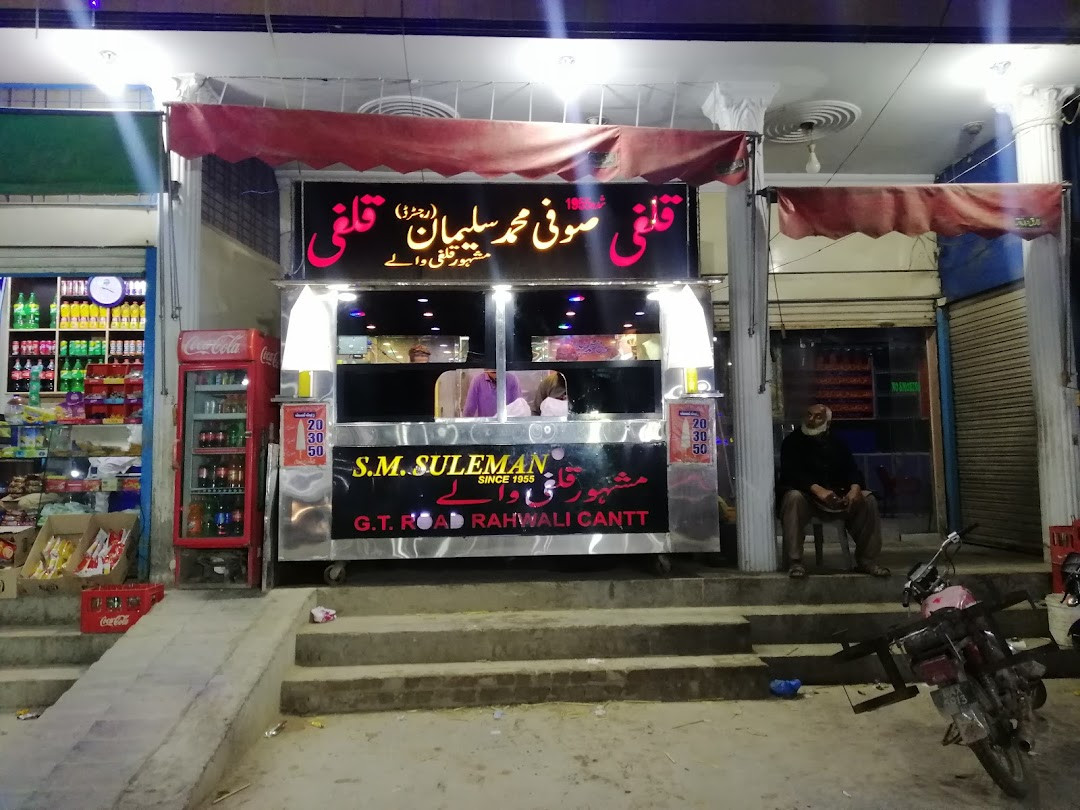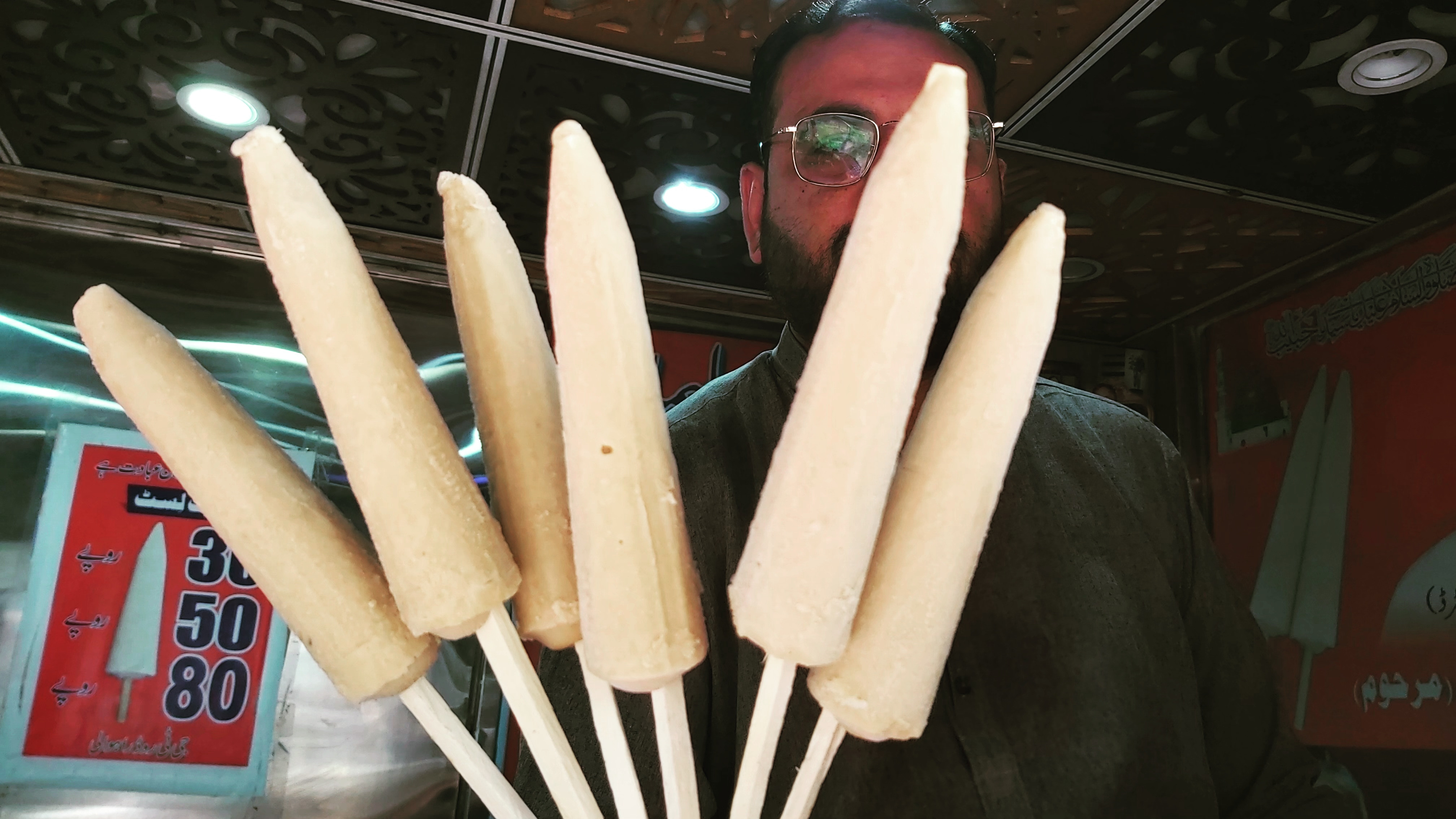It is next to impossible for a foodie in Punjab to not have sampled Sufi Muhammed Suleman’s kulfi from Rahwali, a suburb in Gujranwalla District. This symphony on a stick is created with milk, sugar, khoya, pistachios, cashew nuts and green cardamoms, and to the best of my knowledge has no match in Punjab. The traditional equivalent of ice cream, kulfi is a traditional favourite among grown up and kids alike.
While travelling towards Islamabad from Lahore on the Grand Trunk Road, one has to cover a distance of 17km from Gujranwala to reach this well-known kulfi point, near Cantt gate in Rahwali city.
Whether in the daytime or in the evenings till late, on weekdays or weekends, in summer or winter and on a festive or an ordinary day, Suleman’s kulfi point is mostly crowded as people arrive with their families from near and distant areas and cities such as Ghakhar, Cantt, Kamoki, Wazirabad, Gujrat, and Sialkot, to enjoy Suleman’s delicious kulfi stick. Surprisingly, in winter the demand for kulfi increases as people, dressed in woollies sitting in their cars, enjoy the rich and nutritious ingredients of this dessert. The braver ones sit on the blue wooden benches outside the shop to enjoy their kulfi, which is considered a saughat or a gift from Gujranwalla.
Many of the people enjoying kulfi are those who are commuting on the G.T. Road on motorcycles, cars, buses, trucks, and other vehicles who stop at this kulfi outlet to relish Gujranwalla’s favourite dessert. The boys who work as servers here, quickly rush to the approaching vehicles to take orders for kulfi which costs from Rs 40 to Rs 100. According to the owner, his daily sale is above Rs 80,000 per day.
“This is a family business,” shares Muhammad Azeem, Suleman’s grandson, who according to him was a local folk musician. “My brothers and I run the show, the foundation of which was laid in 1955. My grandfather played the garvi, a musical instrument from rural Punjab.” Suleman lived in a one-room house with his six children.

Following the suggestion of his Sufi peer, Suleman started this business with a loan of five rupees.”
“Initially, playing the garvi to attract the attention of the people, he would sell kulfi on foot, through the streets in the nearby villages,” shares Azeem. “Later, as his kulfi became popular, he started selling on a cart that he parked near the Rahwali railway station and sold kulfi there until he passed away in 1965.”
After the demise of my grandfather, my father (late) Muhammad Ashiq who took over the business. He later shifted the cart to main G.T. Road near the sugar mill. “It was not that he didn’t have to struggle to grow the inherited business,” says Azeem. “On October 6, 1995, he decided to move the cart to the present location near Cantt gate and sold kulfi here for 36 years.”
Azeem’s brother Ghulam Abbas presently owns the business. “A few years ago, we converted the entire traditional system of making and selling kulfi from simple cart to a manufacturing plant to meet the huge demand across Gujranwala division.”
Presently, Suleman’s kulfi business has two branches, one across the other on both sides of G.T. Road to facilitate traffic going in either direction. Whether you are headed for Islamabad from Lahore or on your way back on G.T. Road, you can’t miss this kulfi spot. “It is meticulously prepared with the purest of six ingredients and you won’t find a seventh one in there," says Azeem.
Being a permanent resident of Gujranwala, I have witnessed the journey of Sufi Suleman's kulfi carts grow into what it is in the present day, since my childhood. While passing through Rahwali city, I have always seen long queues of people at Suleman’s Kulfi Point. It would not be wrong to say that Suleman's Kulfi has emerged as a major brand in Gujranwala division due to its originality and unique taste. Although many new kulfi sellers have ventured into the home-grown kulfi business for nearly the past 20 years, yet they have never been able to match the 70-year legacy of Suleman’s kulfi.
“We serve home delivery orders, as well as bulk orders for various private programmes,” shares Ghulam Abbas. “Several schools such as Garrison and Army Public School, colleges and universities such as GIFT University, Punjab University Gujranwala Campus and University of Central Punjab, as well as the Pakistan Army place huge orders to provide kulfi during their prize-distribution or sports events and Punjab Culture Day celebrations. We have special kulfi carts for these programmes to add a traditional touch.”
Abbas proudly talks about the late General Pervez Musharraf being a fan of their kulfi. “When he was the president of Pakistan, during his visit to Gujranwala Cantt, the Corps Commander ordered kulfi from us on his behalf,” he shares. “In 1974, former Prime Minister Zulfiqar Ali Bhutto also had our kulfi, while Nawaz Sharif is also not an exception. Among other key politicians and bureaucrats, Sheikh Rasheed also visited our cart to enjoy traditional kulfi."
After the huge success of Suleman's kulfi, many people ventured into this business and you can spot at least 25 identical blue kulfi carts on both sides of the road in Rahwali, turning the entire area into Gujranwala’s kulfi market.

To emphasise their authenticity, the signboard of Sufi Muhammed Suleman’s modest kulfi outlet bears his photograph that shows a bearded elderly man wearing a traditional cap. It specifies that the brand name is registered and informs that their only branch is across the road. Interestingly, the kulfi carts in the vicinity have clever brand-imitation names such as Salman, Muhammad Salman, Sufi Salman and Subhan, along with pictures of an elderly man on their banners to confuse or lure the new customers away from the original brand of Suleman’s kulfi. The banners also make false claims of being the original, traditional or authentic.
“There is no substitute for Suleman's kulfi in the all of Gujranwala in terms of taste and quality,” says Abrar Hussain, a young boy from People's Colony, Gujranwala, between small bites of kulfi. “I come at here at least three to four times a month.”
Muhammad Zahid and his family had arrived all the way from a fringe village called Khajurwali to have kulfi from Suleman’s outlet. “If someone hasn’t had this kulfi from Gujranwala, they don’t know what they are missing,” he says, buying two sticks each for the kids. Fully satisfied with the taste and quality of the kulfi, Zahid highly recommends others to visit that kulfi point too. “I usually come here alone but bring my family twice a month.
"We do not have any competition with other kulfi sellers in the city and their growing businesses does not affect our business," says Abbas. He further said that his grandfather Sufi Suleman used to say that selling kulfis is like worship for him. “We bear in mind his noble belief and don’t calculate the profit and growth of our business. We believe that by doing so, our business may lose the blessing.”
Mustafa, a fruit vendor since the past 20 years near Suleman’s kulfi claims to have seen many kulfi vendors come and go. “The only one that sells the authentic good stuff in Rahwali is Sufi Suleman’s kulfi spot,” says Mustafa. “People prefer this kulfi to other local brands in Rahwali because of its excellent taste. They have maintained the quality of their product over the years, and that is not an easy task.”
Ilyas, who works at a healthcare centre in Rahwali, agrees with Mustafa. "The only reason Suleman's kulfi business has lasted so long is because they don't compromise on the quality and ingredients of their kulfi,” he says. “I buy a dozen kulfis for my family once a week and I recommend Suleman's kulfi to everyone if they are going past Rahwali on the G.T. Road.”
When Sher Shah Suri built the Grand Trunk Road — little did he know he was paving the way for kulfi to become the star player. Because conquering empires is cool, but conquering cravings on the road is next level!
Waseem Shabbir Arain is a freelance journalist based in Gujranwala. He can be reached at waseemshabbir78@gmail.com
All facts and information is the sole responsibility of the writer
